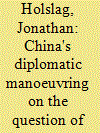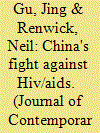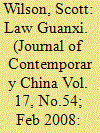|
|
|
Sort Order |
|
|
|
Items / Page
|
|
|
|
|
|
|
| Srl | Item |
| 1 |
ID:
080719


|
|
|
|
|
| Publication |
2008.
|
| Summary/Abstract |
This article assesses China's response to the violence in Darfur. Whereas the People's Republic had already been taking a constructive stance towards international interventions in various intra-state conflicts, the mayhem in Darfur compelled China to take the lead in engaging Khartoum. Beijing's engagement evolved from a rather passive posture, to taking a clear position, and finally, to active persuasion and mediation. During these negotiations, Beijing departed from the interests of the local political elite and tried to meet its concerns, not by imposing measures, but by clarifying the different options and creating trust to find a feasible consensus. From the Chinese perspective this approach was highly successful as it increased its moral influence, reassured its partners in Africa and the West, safeguarded its oil empire in Sudan and upheld its prerequisite of sovereignty and state consent
|
|
|
|
|
|
|
|
|
|
|
|
|
|
|
|
| 2 |
ID:
080720


|
|
|
|
|
| Publication |
2008.
|
| Summary/Abstract |
Officially, there were 650,000 people living with HIV in China in 2005.1 The Chinese government has pledged to keep the total under 1.5 million by 2010. The study argues that China must emphasize non-epidemiological factors as mutually-reinforcing factors sustaining the disease. The fight is entwined with profound economic and social transition. Government and civil society have engaged with the principles and agencies of global HIV/AIDS governance. But HIV intersects with normative regimes addressing issues of humane governance in the widest socio-economic and political sense. Based upon primary and secondary research, the study reviews the evidence of the HIV/AIDS challenge facing China, considers the nature and quality of the national response, and evaluates the relationship of global and national regimes
|
|
|
|
|
|
|
|
|
|
|
|
|
|
|
|
| 3 |
ID:
080723


|
|
|
|
|
| Publication |
2008.
|
| Summary/Abstract |
This paper offers a comprehensive analysis of China bills introduced and passed in Congress in 1973-2005. Three important findings emerge. First, many more punitive China bills were introduced and passed in the House than in the Senate. Second, the two congressional parties agreed with each other most of the time on roll call votes related to China. Third, the major events in US-China relations largely determined the ebb and flow of China bills. Negative binomial regression analysis sheds further light on the dynamic of China policymaking on Capitol Hill. A Republican majority in the House facing off with a Democratic president brought about many more China bills. Also, there appears to be a significant gap between public opinion and congressional attitudes on China policy. Finally, the Tiananmen Incident has had a profound impact on Congress, making it much more active and punitive in China policy since then. I conclude the paper by briefly discussing the policy implications of my findings.
|
|
|
|
|
|
|
|
|
|
|
|
|
|
|
|
| 4 |
ID:
080721


|
|
|
|
|
| Publication |
2008.
|
| Summary/Abstract |
This article outlines political, economic, cultural and military reasons that allow for some optimism that the Taiwan issue can be resolved without the use of force. It describes some of the major trends toward separatism and some counter trends that could lead to a long-term status quo
|
|
|
|
|
|
|
|
|
|
|
|
|
|
|
|
| 5 |
ID:
080718


|
|
|
|
|
| Publication |
2008.
|
| Summary/Abstract |
The newly emerging middle-income stratum represents China's economic and academic elite. Civic attributes and the role the middle class plays in the process of social transformation in China have remained overlooked. This study examines the consciousness of self-identity and social affairs of this middle stratum. Surveys are drawn from two cities in China, Beijing and Shanghai. The result reveals that the majority of respondents are uncertain about their identity of being in the middle-income stratum. However, research shows that while this group shares many social traits in common-a high level of educational attainment and professional skills, and a strong interest in social and public affairs-there has been no sign that this group will function as a social group yet. Social behaviors of the middle-income stratum demonstrate strong individual endeavors rather than coordinated efforts of this newly emerging social group
|
|
|
|
|
|
|
|
|
|
|
|
|
|
|
|
| 6 |
ID:
080722


|
|
|
|
|
| Publication |
2008.
|
| Summary/Abstract |
Political leaders and establishment intellectuals in China often claim that their country is experiencing challenges from the Internet that entail threats to traditional culture, Chinese youth, and existing value orientations and ideology. To meet the challenge, they argue, there is a need to re-think outdated strategies of propaganda. In this article, I coin the term ideotainment, which is helpful for understanding the underlying rationale and concrete outcome of their thinking. Ideotainment is the juxtaposition of images, symbolic representations, and sounds of popular Web and mobile phone culture together with both subtle and overt ideological constructs and nationalistic propaganda. It is argued that strategies of ideotainment are envisioned as an effective means to engage perceived enemies in China's cyberspace, win battles of public opinion, and not least to shore up legitimacy for the Chinese Communist Party in the information age.
|
|
|
|
|
|
|
|
|
|
|
|
|
|
|
|
| 7 |
ID:
080717


|
|
|
|
|
| Publication |
2008.
|
| Summary/Abstract |
Since 1978, China has opened itself to foreign direct investment and has undertaken significant legal reform, especially in the area of international commercial arbitration. I analyze the roles that foreign actors and state officials have played in changing Chinese legal institutions such as the Chinese International Economic and Trade Arbitration Commission (CIETAC) and personal relations, or guanxi.1 Foreign investors, attorneys, and non-governmental organizations are helping China to adopt formal commercial arbitral institutions that follow international norms. In that sense, foreign actors are contributing to rule of law in China. Yet, foreign investors also attempt to use guanxi to get around central regulations, thereby contributing to informal legal institutions. The combination of guanxi and formal legal institutions follows a model of path dependent institutional change. I use the terms, 'layering' and 'bricolage' to elucidate the ways that actors combine existing institutions with new legal forms introduced by foreign investors, attorneys, and NGOs.
|
|
|
|
|
|
|
|
|
|
|
|
|
|
|
|
| 8 |
ID:
080716


|
|
|
|
|
| Publication |
2008.
|
| Summary/Abstract |
Chinese lawmakers and law-enforcers have viewed the hierarchical structure as the defining feature of organized criminal organizations. Such a flawed framework has hampered China's recent efforts to fight organized crime. Based upon organization theory, this paper argues that by adapting to the changing institutional environment, Chinese criminal forces have chosen a variety of organizational structures ranging from hierarchy to the market and the network. The recently uncovered cases point out that networks have become a more popular organizational form than the traditional hierarchies (such as secret societies) and contractual relationships in illicit markets. By offering a classification of organizational formations of organized crime in today's China, the author suggests network analysis as a new tool to help China's law enforcement effectively respond to surging organized crime.
|
|
|
|
|
|
|
|
|
|
|
|
|
|
|
|
|
|
|
|
|